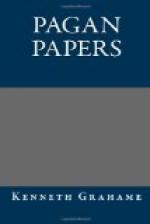If there be any fly in the pipe-smoker’s ointment, it may be said to lurk in the matter of ``rings.’’ Only the exceptionally gifted smoker can recline in his chair and emit at will the perfect smoke-ring, in consummate eddying succession. He of the meaner sort must be content if, at rare heaven-sent intervals — while thinking, perhaps, of nothing less — there escape from his lips the unpremeditated flawless circle. Then ``deus fio’’ he is moved to cry, at that breathless moment when his creation hangs solid and complete, ere the particles break away and blend with the baser atmosphere. Nay, some will deny to any of us terrene smokers the gift of fullest achievement: for what saith the poet of the century? ``On the earth the broken arcs: in the heaven the perfect round!’’
It was well observed by a certain character in one of Wilkie Collins’s novels (if an imperfect memory serveth me rightly) that women will take pleasure in scents derived from animal emanations, clarified fats, and the like; yet do illogically abhor the ``clean, dry, vegetable smell’’ of tobacco. Herein the true base of the feminine objection is reached; being, as usual, inherent want of logic rather than any distaste, in the absolute, for the thing in question. Thinking that they ought to dislike, they do painfully cast about for reasons to justify their dislike, when none really exist. As a specimen of their so-called arguments, I remember how a certain fair one triumphantly pointed out to me that my dog, though loving me well, could yet never be brought to like the smell of tobacco. To whom I, who respected my dog (as Ben saith of Master Shakespeare) on this side idolatry as much as anything, was yet fain to point out — more in sorrow than in anger — that a dog, being an animal who delights to pass his whole day, from early morn to dewy eve, in shoving his nose into every carrion beastliness that he can come across, could hardly be considered arbiter elegantiarum in the matter of smells. But indeed I did wrong to take such foolish quibbling seriously; nor would I have done so, if she hadn’t dragged my poor innocent dog into the discussion.




